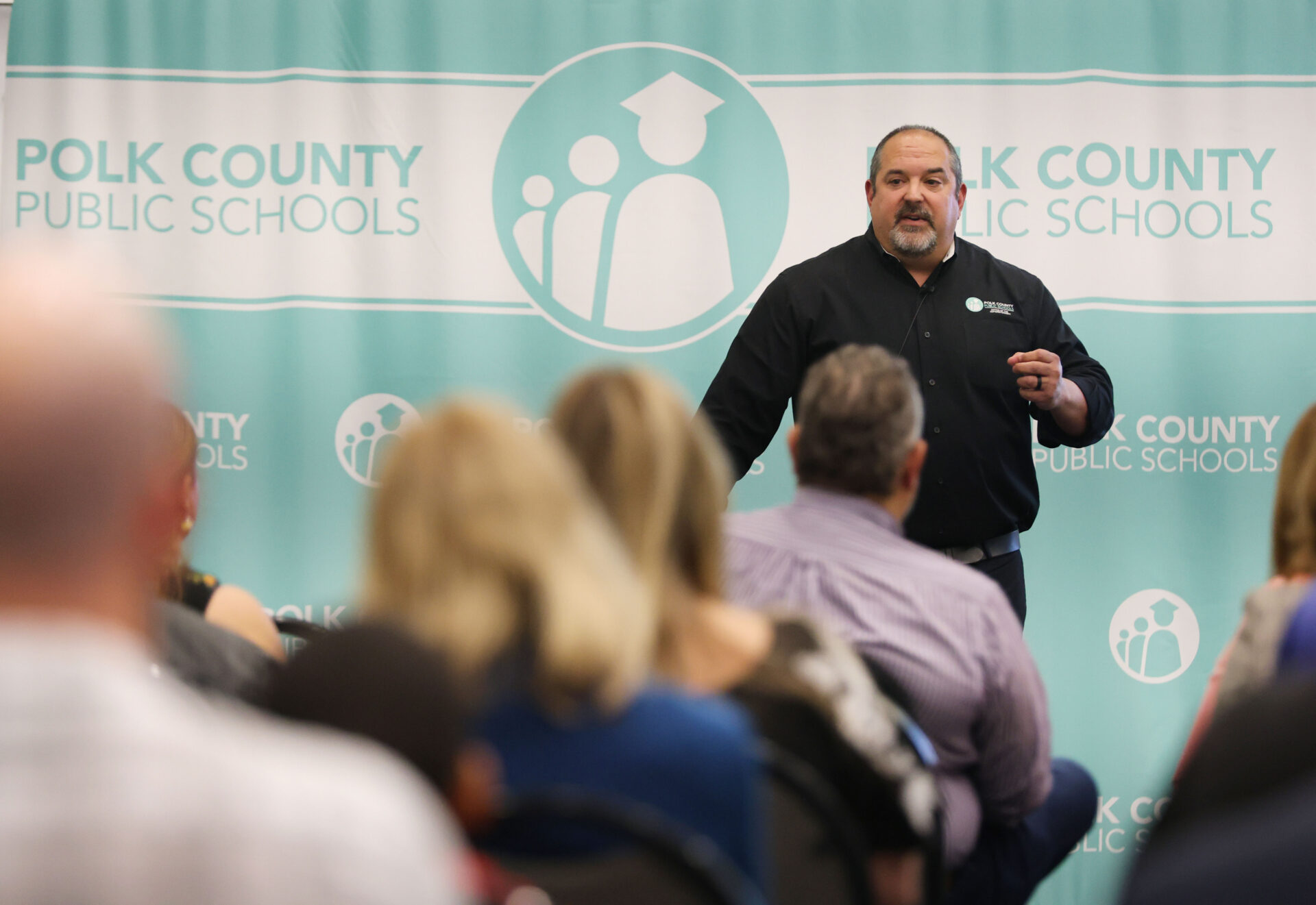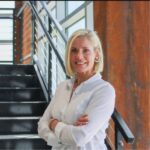
The Business of Building a Better Public School System (and Why Fred Heid is up for the Challenge)
By Rj Walters
Photography provided by Polk County Public Schools
It’sa high-stakes business serving more customers than ever before. Changes come swift and often. Some are celebrated, while others are criticized. It’s a results-focused industry, but it really all begins and ends with relationships—both inside and outside the building.
Its CEO matter-of-factly states there’s “no silver bullet” or quick fixes, but there is a driving passion shared among staff and stakeholders to make the foundation stronger and the future brighter.
And to do that, this broad-shouldered, approachable and action-oriented leader continues to look in the mirror, while somehow keeping both eyes on the road of progress that requires more community members to mentor students, partner on programming and engage in critical conversations.
Fred Heid’s title is Superintendent and the “company” he leads is one of the nation’s 30 most populated public school systems in the seventh fastest-growing county in the United States.
Heid spent almost 10 years as superintendent of a Chicago-area school system prior to being hired by Polk County Public Schools in 2021. He said PCPS was the right spot for his family because during the interview process he and his wife met a wide range of people, from city mayors to school staff to community partners, and every single one of them shared a sincere commitment to the students of Polk County with high expectations for what comes next. Here is a glimpse at the challenges, opportunities and potential solutions in store for the district.
“I won’t give excuses because we really need to improve.” – Superintendent Fred Heid

Looking in the Mirror
Since starting just before the beginning of the 2021-22 school year, he and district leaders have tuned their ears to staff, parents and students, while staying on top of trends and combing through data.
Heid has been in classrooms frequently and has made it a priority to be visible in public, including hosting Community Conversations series to provide updates to and solicit feedback from community members.
He has had a chance to digest real-time data and be in some of the environments that data stems from.
Some of the data is positive. For example, PCPS has the second most accredited and certified academy programs of any district in the nation, and it offers 10 schools with International Baccalaureate programs, as well as a number of other opportunities for rigorous and accelerated learning.
Other data is more troublesome.
The state recently released a report showing the majority of PCPS students in grades 3-10, with the exception being 4th graders, scored below grade level on the final Florida Assessment of Thinking (FAST) Reading test in May.
“I won’t give excuses because we really need to improve. And so many of us were shocked and disappointed by the scores here,” Heid said. “The state of Florida also took a position this year that with this new test, that they would only allow the same amount of A and B and C and D schools to exist that were previously identified, which again flies in the face of logic. Why isn’t a goal to get every school to an A? Why do we make it harder?”
The high school graduation rate in the district is 78.3%, 9% below the state average.
“No one is satisfied with these results. No one is making excuses,” he said in a post on the Polk County Public Schools website. He mentioned the district is constantly working with guidance counselors and success coaches to ensure students meet graduation requirements.
Adam Putnam, a 1992 Bartow High School graduate, and the former Florida Commissioner of Agriculture, has an appreciation for how PCPS served him and his family well, and he recognizes the breadth of how many different communities it is tasked to serve.
“Essentially, if you split Polk County down U.S. 27 you have a county that is primarily rural communities (East side) and a county that is primarily urban communities (West side).”
Gow Fields, a 1981 Kathleen High Grad, and the mayor of Lakeland from 2009 to 2014, went a step further in his opinion on the grandiose nature of managing a district of approximately 115,000 students and more than 13,000 staff.
“There are a lot of people who are very critical of public education because they don’t take into account how challenged public education is since it has to take every student,” he said. “Private schools don’t have to take every student, charter schools don’t have to take every student and even your magnet schools or the academies, if kids can’t keep up, they will counsel them or encourage them to go back to their zoned school, if you will.”
Private schools don’t have to take every student, charter schools don’t have to take every student, and even your magnet schools or academies, if kids can’t keep up, they will encourage them to go back to your zoned school, if you will.” – Gow Fields, Lakeland businessman and former mayor

Paving a Road to Progress
“Nothing frustrates me more than being told, ‘This is how we’ve always done it,’” Heid said. “Because to me, here’s what I hear: kids have to wait until the adults figure it out.”
One way district officials are figuring it out is by analyzing existing programs and resources.
“When I arrived here…we had over two dozen reading (intervention) programs across the district, and we actually did the analysis on them. We eliminated the ones that didn’t (have a positive impact on student outcomes)…and so we’re down to seven or less,” he said. He also said the district has eliminated redundant contracts to free up money in the general budget.
“There’s an old saying, you can’t grow something new in the garden until you weed it out…you’ve got to get rid of the old to make room for the new and create opportunities for it to grow.”
While looking to implement new programs and provide adequate resources to serve all students, Heid mentioned two other high-priority challenges that require strategic intervention.
The first is a diminishing workforce in an environment where districts are vying for the same candidates. As of the beginning of the new school year, PCPS had roughly 300 teacher vacancies across the district.
There is also the expectation that PCPS could add as many as 7,000 additional students this year, meaning the population boom of the past few years is still in full force.
“We’re developing love handles on the east and west side of our school districts,” Heid said, noting that Polk is a bedroom community for Orlando and Tampa workers. He also mentioned the importance of the half-cent sales tax for schools, a key funding source for building new schools and improving existing ones.
Heid strongly believes the future of the district hinges on being able to expose students to career options at younger ages, offering more career training paths, and ultimately being a pipeline that works with small businesses and large corporations in Polk County.
The large number of academies and vocational training options (see the “From Kindergarten to Careers” article for an in-depth look) is a strong foundation for developing workforce ready students, but it’s only the beginning. Heid wants his staff at the table with entrepreneurs, CEOs and business and nonprofit leaders, discussing what their needs are, how they can partner with them to provide internships (including helping pay wages in some cases) and how to get them mentoring students, beginning as early as elementary school.
In Polk County there is an express need for contractors and construction workers—everything from masons to painters to carpenters. The medical profession is also in desperate need of more skilled workers; that includes nurses and doctors, but also certified technicians for a multitude of specialties.
One way PCPS has prioritized the development of partnerships between local businesses and local schools is by creating a Community Liaison position for each of the district’s five regions.
Community liaisons attend public meetings, network with professionals and work with regional superintendents and school principals to create long-lasting relationships that benefit students, teachers and communities at large.

It Won’t Happen Without Help
Heid admits there hasn’t always been streamlined processes to effectively partner with PCPS schools—and for too long, too much of a burden has been put on principals—but the new structure and priority on collaboration should serve as a fresh reset. With that in place, he isn’t shy about stating how fundamental community involvement is to the long-term success of students and families.
“Really what our schools need is they need more time, more effort. So if there are retirees, if there are people who are looking to give back to their community, and help support a student who’s learning to read, learning to do math, or just simply build a meaningful relationship…we’re open to that,” he said.
Fields, a successful businessman who is married to Kay Fields, a longtime school board member and the CEO of Girls Inc. Lakeland, agrees that the fortune of public school students is not just the responsibility of educators.
“[We need people] being engaged and being willing to speak at schools to students that are at that age where speaking to them or sharing with them about your career is meaningful,” he said. “For the younger kids, going and reading to them is very helpful so that they see that there are people who are not paid to be there who actually care about their education, their growth and development.”
In 2019, a group of Lakeland community influencers created the nonprofit Lakeland Leads to create an intentional space for business and education leaders to join forces to create better student outcomes and a more promising economic future for our communities.
Lakeland Lead’s executive board includes leaders from entities including Publix, GrayRobinson, AgAmerica and Harrell’s, and its advisory board is an impressive mix of educators and nonprofit visionaries.

Lakeland Leads President Melody Rider
Lakeland Leads President Dr. Melody Rider said they “need businesses to engage like never before with K-12 education to inspire, mentor and foster the next generation.”
“This is our community, our students and our responsibility,” she said.
Businesses can become part of the solution by visiting lakelandleads.org or emailing the nonprofit at info@lakelandleads.org.
Sheriff Grady Judd, who graduated from Lakeland High School in 1972, said in terms of responsibility he would love to just see folks get the basics down pat. He said people might not like the reading or math scores they see in the district, but he also points to data like unexcused absences and number of schools attended in a year to determine student health.
“First off, if you spend 20 minutes a day with your child reading, that’s more than the average amount of time that a parent spends with [their] child at all,” he said. “If you read 20 minutes a day with your child, your child will grow up to be successful. 99% of the time that’s a guarantee.”
Heid might chuckle at the sentiment that it could all be that easy, but it is the small and consistent wins along the way that fuel the fire in his soul to figure out how to help kids read, and every other important skill under the sun, as long as they are a student of Polk County Public Schools.
“I constantly remind our staff every single day is an opportunity to change the trajectory of a student’s life,” he said. “There’s all kinds of known barriers that may prevent that student from being successful, but you have an opportunity every day to start anew and try and make a difference with that kid. And nothing makes me happier to see (than) our kids being successful in class.”
